by SHELAGH STEPHENSON
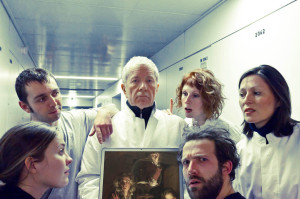 A social drama, a science play, a thriller
A social drama, a science play, a thriller
Something revolutionary is happening at the Fenwicks’, while there’s trouble in the air at Ellen and Tom’s. Fenwick is taking science to dizzying heights, his assistant is after the maid and a mob is rioting at the front door. Ellen, a geneticist, has moral qualms about a job offer and Tom is unemployed. The Fenwicks are living in 1799, Ellen and Tom in 1999 – in the same house. There’s a body in the basement. Who buried it there 200 years ago?
Shelagh Stephenson explores the question of how much morality science can take – and how much it needs – with two compelling examples from two different times in history. To what lengths should the study of anatomy go to procure cadavers at the end of the 18th century? And how far should genetics go at the beginning of the 21st century?
What is good and what is evil science? Shelagh Stephenson projects this question further back in time than most do. Academic debate on the ethical limits to scientific research often focuses on the atomic bomb and unscrupulous Nazi researchers. However, the long period in which body snatching was commonplace for the study of anatomy goes back 150 years before then and is a dark chapter in the history of colonial England between Newton and Darwin.
Modern genetics is constantly forced to deal with the heatedly debated social relevance of its work and results. Genomic research will soon be able to decode our entire genetic make-up at little expense. Will we soon find out in the neighbourhood “Gene Shop” that we are particularly susceptible to alcoholism, cancer, or Alzheimer? Is that something to take seriously? And is it something that we want to know? Who else might want to know, and why?
An Experiment With an Air Pump was the second production in our Science & Theatre program.
Supported by 
![]()
Shelagh Stephenson was born in Northumberland and read drama at Manchester University. Her first play, The Memory of Water (1995) was a huge success and won her an Olivier Award for Best Comedy; her second one, An Experiment with an Air Pump (1998) was equally sucessful and won the Peggy Ramsay Memorial Award. Other plays are Ancient Lights (2000), Mappa Mundi (2002), and Enlightenment (2005). Her latest one is A Northern Odyssey (2010) about American painter Winslow Homer´s two-year visit to Northumberland in the early 1880s. She has also written numerous radio plays and TV scripts. The Memory of Water was made into a film called Before You Go (2002) starring Julie Walters and Tom Wilkinson and directed by Lewis Gilbert.
 “By dignity I mean the prospect of a terrible indecency” Howard Barker
“By dignity I mean the prospect of a terrible indecency” Howard Barker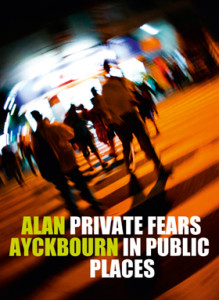 Six people in a big city. All of them are in search of a home, a niche or a relationship.
Six people in a big city. All of them are in search of a home, a niche or a relationship.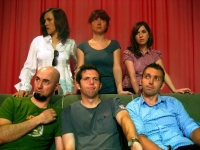 In fifty-four scenes – some of them just short clips – Alan Ayckbourn masterfully creates an atmosphere of exquisite melancholy and grotesque failure. His sympathetic view of the characters keeps schadenfreude and black humour at bay and instead makes us grin at the all-too-familiar situations from our own lives. With a keen humane eye, Ayckbourn finds a universal language for the impossible dream of fulfilled desires.
In fifty-four scenes – some of them just short clips – Alan Ayckbourn masterfully creates an atmosphere of exquisite melancholy and grotesque failure. His sympathetic view of the characters keeps schadenfreude and black humour at bay and instead makes us grin at the all-too-familiar situations from our own lives. With a keen humane eye, Ayckbourn finds a universal language for the impossible dream of fulfilled desires. (Girl) I want hold him
(Girl) I want hold him Oh, I know yours isn’t – but I bet you know of someone’s who’s is!
Oh, I know yours isn’t – but I bet you know of someone’s who’s is!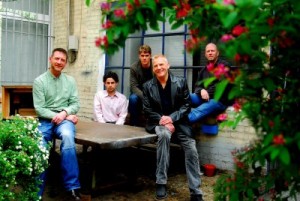
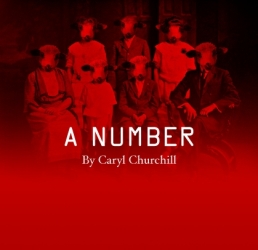 “Walk round the corner and see yourself you could get a heart attack. Because if that´s me over there who am I?”
“Walk round the corner and see yourself you could get a heart attack. Because if that´s me over there who am I?”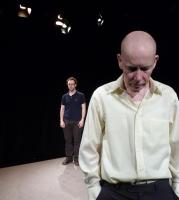 Caryl Churchill’s compelling thought-experiment has a single, simple premise: humans have been cloned. In one hour of ferociously intense tragicomedy, she digs down to the roots of personal identity, exposing the hard but brittle bond between fathers and sons and the ultimate cost of evasion. The past can be buried, but it won’t stay down.
Caryl Churchill’s compelling thought-experiment has a single, simple premise: humans have been cloned. In one hour of ferociously intense tragicomedy, she digs down to the roots of personal identity, exposing the hard but brittle bond between fathers and sons and the ultimate cost of evasion. The past can be buried, but it won’t stay down.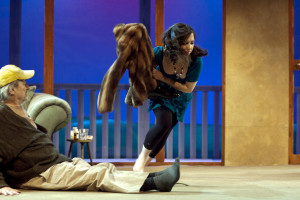 A quirky, often frightening family of antagonists in a claustrophobic farmhouse somewhere in the American Midwest
A quirky, often frightening family of antagonists in a claustrophobic farmhouse somewhere in the American Midwest Having come home to visit her mother who has been placed in a nursing home, Diane, now a well-known writer, is being interviewed for the local newspaper. Her remarks are an answer to questions such as where she gets the ideas for her stories, whether her youth in Mountain Grove influenced her work and why she decided to leave home. At first obliging and matter-of-fact, Diane gradually reveals more than her interviewer might have bargained for a childhood marred by the loss of her father and her mother´s coldness; the promiscuity which she was driven to in search of the love and concern which were denied her at home; and, most devastating of all, the molestation by her stepfather which shaped her character indelibly – and led to the harrowing event which she describes at the end.
Having come home to visit her mother who has been placed in a nursing home, Diane, now a well-known writer, is being interviewed for the local newspaper. Her remarks are an answer to questions such as where she gets the ideas for her stories, whether her youth in Mountain Grove influenced her work and why she decided to leave home. At first obliging and matter-of-fact, Diane gradually reveals more than her interviewer might have bargained for a childhood marred by the loss of her father and her mother´s coldness; the promiscuity which she was driven to in search of the love and concern which were denied her at home; and, most devastating of all, the molestation by her stepfather which shaped her character indelibly – and led to the harrowing event which she describes at the end.